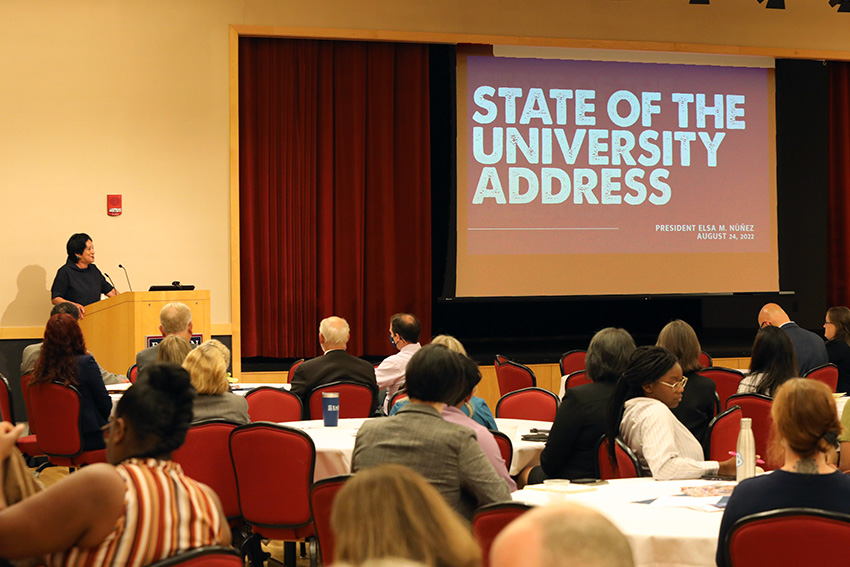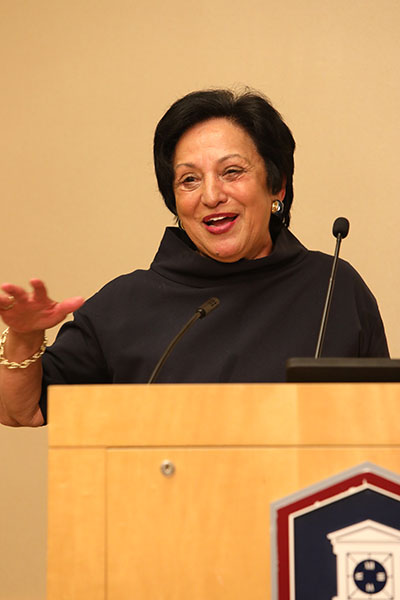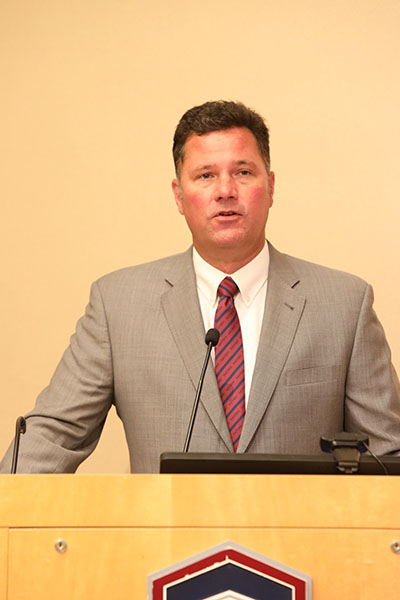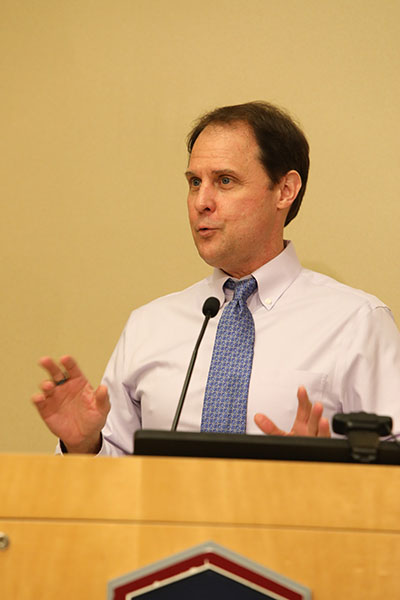- Apply
- Visit
- Request Info
- Give



Published on August 31, 2022

Hundreds of faculty and staff packed the Betty R. Tipton Room on Aug. 24 for the first in-person University Meeting in more than two years. Following employee/retiree recognitions, President Elsa Núñez delivered an enthusiastic State of the University Address that praised Eastern’s diligence and good fortune while acknowledging the various challenges on the horizon.

“Today is historic, for today we come back together in person, as colleagues and as friends, in this very special place,” said Núñez of the first non-virtual University Meeting since January 2020. Having endured the on-going pandemic, she added, “We are stronger and more resilient as individuals, and when we are stronger and more resilient, Eastern is stronger and more resilient.”
Núñez turned to legendary New York Yankees hall-of-fame pitcher Lefty Gomez, who famously said, “I’d rather be lucky than good.” She assured the crowd that in recent years, Eastern has been both lucky and good.
Concerning the enrollment shortage that is plaguing colleges and universities nationwide, she said that spring 2022 enrollment turned out better than expected. Budget wise, due to federal COVID relief funds, increased state appropriations and sound fiscal management, Eastern was able to maintain a balanced budget in fiscal year 2022.
“We’ve been good, but also lucky,” said Núñez. “Eastern’s financial position is strong. We are fortunate to have put aside net savings from past years into reserves, and we will use our reserves as necessary to maintain the level of support required to meet the needs of our students, faculty and staff.”
She assured faculty and staff that the University has a balanced budget for fiscal year 2023 that reflects the realities of today, including inflation and budgetary constraints.
The president then turned her attention to student affairs. With myriad difficulties of the pandemic still lingering, she said, “Mental health remains our greatest concern for students.” To meet increased demand for counseling services, Eastern has bolstered its staff in Counseling and Psychological Services (CAPS), with a record high 10 full-time people.

Relatedly, Eastern has a new partnership with the JED Foundation to improve mental health resources, as well as Proto-Call, an after-hours crisis phone service. Staffing has also increased in AccessAbility Services and the Unity Wing.
Academically, Eastern has two deans ready for the new academic year. Emily Todd now leads the School of Arts and Sciences and Niti Pandey leads the school of Education and Professional Studies. Additionally, the Liberal Arts Core (LAC) is undergoing upgrades, with new courses and a course planning institute in the works.
Despite demographic downturns hampering enrollment, Núñez noted that last year’s incoming class is on track for 83% retention—“Our best retention ever!”
Key to enrollment is the value of an Eastern education, and one of the best outcomes for value is employability. “Employment is our students' top priority,” said Núñez. “By the time they graduate, we want every student with a plan to lead them to employment.”
The Office of Career Success—formerly the Center for Internships and Career Development—has been relocated to the Academic Success Center (ASC) on the first floor of the library so that the office’s career preparation is more closely connected to advising. Additionally, each major is developing its own employability plan for students, with a designated employability liaison.
The president also laid out three existential challenges that face Eastern and institutions everywhere: equity, authoritarianism and climate change.

To address the issue of equity, she noted that with the help of TNG consultants, which just released a favorable review of Eastern, the University is improving its Title IX procedures. To support junior faculty of color in their professional development, Eastern is also a co-founder of the North Star Collective. For law enforcement, Eastern is implementing a police advisory board. And across campus, the Office of Equity and Diversity and the JEDI group—Justice, Equity, Diversity, Inclusion—continue to be active advocates and event sponsors.
Regarding the authoritarian threat to American democracy, Núñez stated, “The role of the liberal arts is to protect democracy… Do we have a role in helping our students become good citizens—yes!” she affirmed.
Regarding the effects of climate change, she said, “This is a time for action like none other… each passing day, our ability to mitigate environmental challenges becomes harder.” She reminded the crowd that Eastern has a long history of sustainability and environmental advocacy, and was happy to introduce Patty Szczys as the new executive director of the Institute for Sustainable energy.
In closing, Núñez went off script to recall a professor from her youth who made all the difference in her life, and whose impact has been a driving force of her career. “Education is transformative. I truly believe it. Your work here is important,” she told the faculty and staff. “For the students, you all touch someone’s life.”
Written by Michael Rouleau